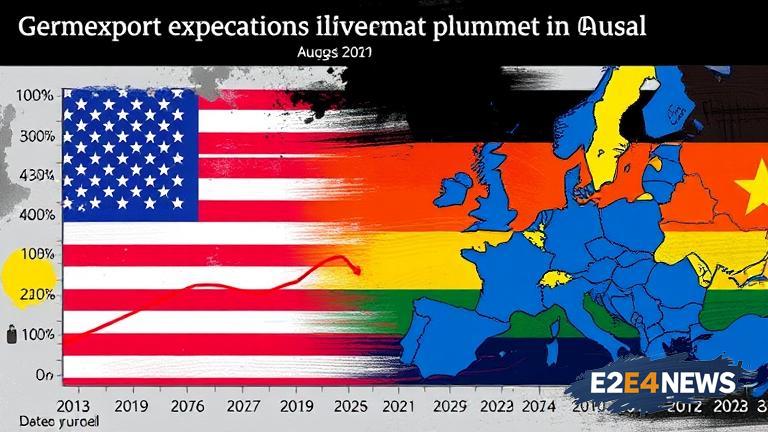The German export sector, a significant contributor to the country’s economy, has witnessed a collapse in expectations for August. This downturn comes as a surprise, given the recent US-EU trade deal that was expected to boost trade relations between the two economic powerhouses. The deal, aimed at reducing tariffs and increasing trade volumes, has failed to instill confidence in German exporters. According to a recent survey, export expectations have plummeted, with many businesses citing uncertainty and a decline in demand as major concerns. The German economy, heavily reliant on exports, is likely to feel the pinch of this decline. The country’s manufacturing sector, in particular, is expected to be hit hard, with many companies already reporting a slowdown in production. The US-EU trade deal, while a positive step towards reducing trade tensions, has not been enough to offset the global economic slowdown. The ongoing trade war between the US and China has also had a ripple effect on the global economy, with many countries, including Germany, feeling the impact. The European Central Bank has already taken steps to stimulate the economy, but more needs to be done to address the underlying issues. The German government has also announced plans to increase spending and cut taxes to boost economic growth. However, these measures may not be enough to offset the decline in exports. The country’s exporters are also facing increased competition from other countries, particularly in the Asia-Pacific region. The rise of protectionism and trade tensions has made it challenging for German businesses to compete in the global market. The US-EU trade deal, while a step in the right direction, needs to be followed up with more concrete actions to reduce trade barriers and increase cooperation. The deal has also been criticized for not addressing some of the key issues, such as agricultural subsidies and digital taxes. The German economy is not alone in facing challenges, with many other European countries also experiencing a slowdown. The EU as a whole is facing a period of uncertainty, with the UK’s exit from the bloc still unresolved. The German export sector is likely to remain under pressure in the coming months, with many businesses already preparing for a worst-case scenario. The government and the European Central Bank need to work together to implement policies that will support the economy and boost exports. This could include measures such as increasing funding for research and development, improving infrastructure, and providing support for small and medium-sized enterprises. The US-EU trade deal is a positive step, but it is only the beginning. More needs to be done to address the underlying issues and support the German export sector. The country’s economic growth is likely to remain sluggish in the coming months, with the export sector being a major concern. The government and the European Central Bank need to take decisive action to support the economy and boost exports. The German export sector is a significant contributor to the country’s economy, and its decline could have far-reaching consequences. The US-EU trade deal has provided a glimmer of hope, but it is not enough to offset the decline in exports. The German government and the European Central Bank need to work together to implement policies that will support the economy and boost exports.
